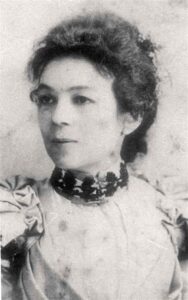by Barbara Baynton (1857-1929)
 Baynton’s Human Toll is a gothic novel, almost unrelievably dark. The passage we have chosen here is a relatively lighter one, illustrating Ursula’s yearning for freedom from her oppressive foster parents, the Rev and Mrs Civil.
Baynton’s Human Toll is a gothic novel, almost unrelievably dark. The passage we have chosen here is a relatively lighter one, illustrating Ursula’s yearning for freedom from her oppressive foster parents, the Rev and Mrs Civil.
One afternoon passing Granny Foreman’s cottage, she stopped to watch her thriftily gathering seed from balsam, stock and four-o’clock.
“The butterflies gather the wild-flower seeds for God, Granny.”
“‘Deed they doesn’t. They fills their bellies wi’ ther ‘oney’,” bleated Granny blastingly.
Partially disillusioned, Ursula stood regarding the prosaic old woman thoughtfully till the intermittent blare of Ashton’s circus rumbling down the hilly roads caught her ear. She ran and joined the mob who had turned out to honour its coming. The tinkling cymbal and sounding brass of its itinerant band stirred her strangely. Heedless of everything, she followed with the barefooted, bareheaded children of the street, till it disappeared into the capacious back-yard of “Pat the Jew’s” livery stable.
“Wait,” said Nellie Lewis, the shoemaker’s big-mouthed daughter, points of light blinking from her porcine eyes— “wait and yous ‘ll all see ’em pitchin’ their tent over on the flat.”
Obediently Ursie waited, and a gratified thrill widened her eyes and warmed her heart when, among the great actors about to pitch the tent, she recognised Jim. An exalted flush tingled over her body as he, no way puffed up by his artistic employment, recognised and beckoned her with one long, dirty finger to come within whispering distance.
“See Fanny, Ursie, an’ tell ‘er ter come an’ ‘ang roun’ about ‘ere ter-night, an’ I’ll git ‘er in.”
“Me too, Jim?”
“Yerz,” promised he.
Never would the girl forget that night, with its tinselled and spangled glories. She had never danced a step in her life, but that experienced girl capering with circus grace in the Highland fling would, she knew, be as nothing to her given such inspiriting music. Were she but the daring equestrienne jumping through the flaming hoops, little it would matter to her if her gauzy skirts did catch. Death before the wonder-held eyes of such a throng would be painlessly sweet. She had been astride old Cushla led by Jim, and a mild trot had been an ideal; but she felt that the maddest freaks of those circling horses could not unseat her now, if the band played while she dared. She sighed heavily, for, alas! her wonderful potentialities were known only to herself. Lucky, lucky Kate Ashton to enjoy this triumph, and she so big and tall, yet, as the bill-posters said, only seven. But, of course, living always with such clever people, how could she help being big and clever for seven? Never for a moment could she be sad, with the clown continually saying such funny things or cutting such curious capers.
Her mind tragically focussed the cruel contrast between the morrow Sabbath’s programme for the bespangled circus girl and herself. She, seated between her aunt and Mr. Civil (now retired from the ministry on a pension), listening to the wind (for it was autumn) howling vengefully round the porch; while this envied, bedight girl eating her manifold chocolate gifts, would merrily go forth to further triumphs, laughing at the clown, so philosophically funny, despite the cruel ringmaster’s whip cuts. Ah, to be of them! Tears shrouded her sleepless eyes, and her introspection made her oblivious to the fact that the circus arena was emptying of the actors. Jim, seeing and misinterpreting her evident sorrow, remarked that, “The ole cirkis company is a roguin’ lot ov robbers; it’s on’y a little after ten, an’ ‘ere’s the b—s pullin’ down the tent about our ears, cuttin’ it short because ov its bein’ on’y their one night.”
It was even so, for with indecent haste and indifference to the vehemently disapproving, waiting audience, the circus men began to untie the ropes, and amongst the last Ursie went out sorrowfully in the rear of Fanny. But not the circumstances of the unduly ended performance, dismantled pole, nor Jim’s loud assertion, “S’ep me Gord! I’ve see a better cirkis among the blacks on the Warrego” could take the ambitious taste from Ursie’s unsatiated mouth.
Oh, to be one of them, with the clown, merry, smiling, and whip—oblivious, for an uncle, instead of Mr. Civil!
She sighed hopelessly, for difficulties great and unconquerable stood between her and these light-hearted folk of the tinsel and spangles.
At dawn next morning she climbed on her bedroom roof to verify that the glories she saw on the night before had not been dreamed. Like dutiful Lot (unremembered but for his daring wife), she saw a cloudy mist going up to heaven—nothing else! Her mighty had flown, but they had taken her heart with them to that great world beyond these hills and near the sea. Soon as opportunity was hers, she took from the sitting-room shelf a shell, and placing it against her ear, she listened to its sea call to her. The river suited best this mood (for it led to the sea), and thither she went; nor could she be found that morn for church.
Barbara Baynton
Human Toll
first pub. 1907
188 pp
Free downloads:
Project Gutenberg
Librivox (audiobook)





One thing that struck me while reading this extract, was the acceptance of so many adverbs in literature at the turn of the twentieth century. I just finished reading a book published in 1943 and the written language was like plodding my way through deep and sticky mud. I wonder what readers of the future will comment on when they pick up books published in our time?
Hi Jill. Tastes in style certainly have changed. What is the 1943 book you’re reading? Are you researching the period for your own writing?